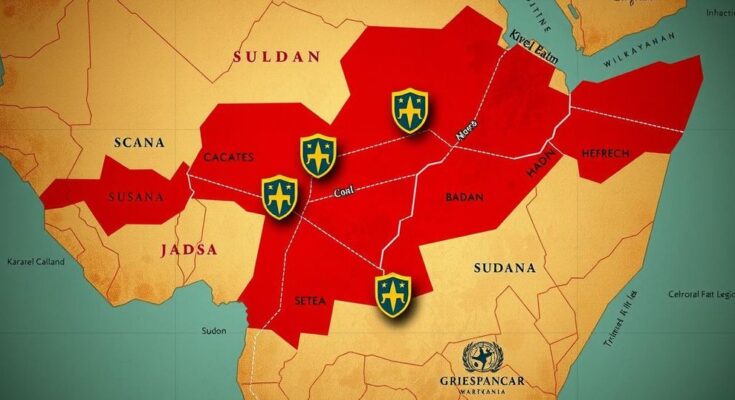Sudan’s civil war is nearing its second anniversary, with dire consequences for the country’s stability and humanitarian situation. The conflict has affected 30 million people, caused massive displacement, and inflicted significant economic losses. Historical misgovernance and military coups have driven the crisis, with ongoing battles between the SAF and RSF suggesting a possible partition of the nation. The international community expresses grave concerns about Sudan’s future, emphasizing the importance of preserving its territorial integrity.
As the civil war in Sudan nears its second anniversary on April 15, the nation faces a turbulent and divisive climate. This conflict’s developments will have significant repercussions across the politically unstable Horn of Africa. The situation remains dire; recent UN reports reveal that approximately 30 million individuals, constituting two-thirds of Sudan’s population, are affected by this humanitarian crisis, with over 14 million displaced, including nearly 3.5 million seeking refuge in neighboring countries. The casualty rate exceeds 20,000, although the true figure may be significantly higher due to undocumented violence. The economic toll is dire, with projected losses of $15 billion and an anticipated 48% decline in GDP by 2025.
Sudan’s extensive history is marked by civil unrest and misgovernance. Since its 1956 independence, the nation has witnessed 15 military coups and two civil wars that resulted in 1.5 million deaths and the secession of South Sudan in 2011. The current crisis can be traced back to the 30-year autocracy of dictator Omar Hassan al-Bashir, who was ousted in April 2019 following widespread protests. Efforts to establish a joint military-civilian governance framework collapsed after two years, culminating in a military coup in October 2021 led by Gen. Abdel Fattah al-Burhan. Amidst demands for civilian rule, an armed conflict erupted between the Sudan Armed Forces (SAF) and the para-military Rapid Support Force (RSF) on April 15, 2023.
Attempts to negotiate peace have continually failed, despite numerous interventions in Jeddah, Doha, and Geneva. Temporary ceasefires were unsustainable and the SAF has made some gains against the RSF, regaining control of key areas, including most of Khartoum. However, the RSF is still entrenched in Darfur and other regions, where tribal militias hold sway. The struggle between these factions goes beyond ideological differences, revealing personal ambitions amidst ongoing chaos.
Recent geopolitical developments suggest a potential de facto partition of Sudan, prompting both factions to strategize for influence. The RSF has proposed a ‘New Sudan’ government plan, while the SAF announced intentions to form a transitional government aimed at rebuilding the nation. However, it remains uncertain what this new government will look like. Both factions claim to represent Sudan’s interests, but their primary focus appears to be consolidating power.
International reaction to these developments has been cautious. The UN Security Council expressed serious concerns regarding the RSF’s initiatives, fearing a deterioration of the humanitarian situation. Similarly, the African Union warned against recognizing any government that may facilitate Sudan’s partition, echoing the EU’s stand on maintaining the nation’s territorial integrity. International stakeholders are wary of creating a fledgling state that could exacerbate regional instability, particularly given the tumultuous histories of countries like Libya and Chad that border Sudan.
Despite global reluctance toward acknowledging a partition, the Sudanese civil war’s situation remains complex and underreported amid other international crises. Regional support is divided; the SAF government is acknowledged by Egypt, Turkey, and Iran, while the RSF potentially receives backing from the UAE and other entities. Analysts speculate that a partition might be a necessary evolution in this entrenched conflict, allowing both sides to stabilize their territories. Nevertheless, such optimism juxtaposes stark realities, indicating a fundamentally uncertain future for Sudan.
In summary, Sudan faces a precarious situation as its civil war approaches two years, with escalating humanitarian crises, potential partition, and entrenched political turmoil. The historical context of misgovernance and military coups has laid the groundwork for current conflicts between the SAF and RSF, both vying for control of the nation. Despite international reservations about partitioning Sudan, internal and external geopolitical dynamics continue to evolve. As the prospect of division emerges, the focus remains on how this will affect regional stability and the countries surrounding Sudan.
Original Source: www.ndtv.com




